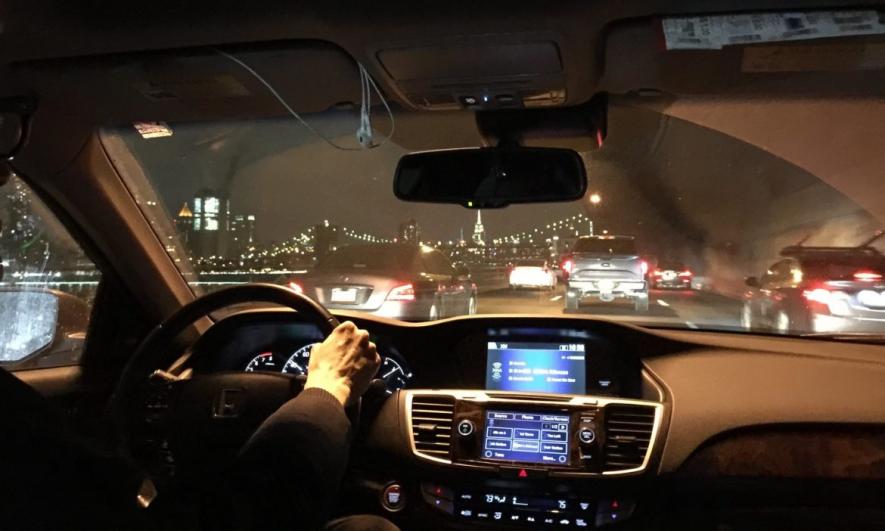Why Courts Are Ruling That Gig Economy is Paving Road to Serfdom

The tech industry buzzword “gig” has distracted society from important questions about the gig economy that are surprisingly traditional: whether a business has employees or contractors, and how it can avoid payroll taxes and legal liability.
Countless Silicon Valley business models have been built under the guise of gigs, Uber and Lyft two of the best known cases, which is ironic considering that for all of their high-tech pretensions, at the core both are taxi and food delivery services. But with state governments like California facing increasing revenue shortfalls and an estimated 57 million gig workers in the United States noting a lack of employer protections and fair wages, the matter has shifted to the courts.
Uber and Lyft now find themselves at the centre of years-long legal disputes on this question. Court challenges, however, are now extending beyond these two companies.
Over the past 40 years, the rise of neoliberalism has enabled employers to tilt the terms of our capitalist economies heavily toward capital and away from labour, via the evisceration of unions, the deconstruction of the welfare state, and the privatisation of public services. The growing use of the independent contractor classification represents the latest attempt to exploit and amplify this power imbalance.
The exploitation of this labour loophole is symptomatic of the rise of what author Albena Azmanova has called “precarity capitalism” in her new book, Capitalism on Edge, a condition that Professor James Galbraith has described as “a minority ensconced in a diminishing set of safe career paths or sufficient wealth not to bother worrying about [economic insecurity], and a majority living in persistent anxiety over the costs of health, housing, education, the quality of public services and other formerly ordinary attributes of middle-class life.” What makes this trend particularly galling is that the main economic drivers of this transition to serfdom fancy themselves as enlightened, socially “woke” corporations, be they Uber, Lyft, DoorDash, or Amazon, but in fact all embrace employment practices more evocative of the 19th-century robber barons.
As the protections governing the traditional employer-employee relationship have been increasingly subverted, workers have responded by turning to the courts to rectify this loophole that has allowed their employment conditions to become a form of indentured servitude. And the courts are largely ruling in their favour.
A California superior court judge has recently denied injunctive relief to both Uber and Lyft, which means that they will be forced to comply with earlier rulings, and a California state statute, that mandated them to reclassify their workers as employees (although the original August 20 deadline has now been extended until October so that the companies’ full appeal can be considered by the California Court of Appeals). The original California ruling confirms a similar ruling made by a New York federal judge in July.
These are also consistent with a growing number of decisions in other countries, such as the UK, where Uber is now appealing a lower court ruling that its drivers should be classified as employees “entitled to employment protections such as a minimum wage and holiday pay,” and in Canada, where the country’s Supreme Court has recently ruled that Uber drivers were entitled to sue for traditional benefits and vacation pay.
Equally striking is some of the sharp language deployed in these proceedings against the practices. In the judgments, the courts explicitly highlighted the massive imbalance in the so-called “contractor” relationship between the companies and their respective workforces, which invalidates any notion of the “contractors” being genuinely independent.
In the Canadian case, Uber Technologies Inc. v. Heller, the Supreme Court specifically cited the inequality of bargaining power between the plaintiff and Uber, noting that driver David Heller was, in fact, powerless to negotiate any of its terms of his engagement with the company (which largely invalidated the notion that he was an independent contractor as Uber alleged). Likewise, in the UK Court of Appeals case, Uber BV v. Aslam, the judges noted that Uber’s “drivers do not market themselves to the world in general; rather, they are recruited by Uber to work as integral components of its organisation.” In other words, Uber exercises full control over them as employees, but it attempts to escape its obligations by designating the drivers as independent contractors. Consequently, the UK Court of Appeal characterised Uber’s description of the work relationship “a sham.”
The success of these legal cases has encouraged further challenges: DoorDash, “the US market leader in food delivery,” is now being faced with a preliminary injunction by San Francisco’s district attorney to “force the company to reclassify its workers as employees,” reports the Financial Times.
Displaying Leona Helmsley-like contempt for the rulings, Uber and Lyft are both threatening to suspend their service if they have to reclassify their drivers as employees. This, of course is as flimsy a threat as could be imagined: how many publicly traded Fortune 500 companies would dare to tell stockholders that they plan to cut themselves off from revenue as part of their business strategy, especially if the long-term goal is to use their “contractors” to establish a consumer base, while they work to perfect the robotic technology that ultimately enables the company to replace them with self-driving cars (a strategy that is hard to execute if the companies threaten to shut down their operations whenever they encounter a law they don’t like)? That is their only plausible path to profitability in the longer term, assuming, of course, that the self-driving cars fully develop the capacity to recognise a pedestrian, so that they don’t kill them.
In fact, both companies are haemorrhaging cash even as they operate with the existing legal loopholes. Meanwhile, their interim strategy is to make their exploitation legal for as long as possible: In addition to the shutdown threats, they are deploying considerable sums to have the California statute overturned via a ballot measure, Proposition 22. The state of California estimates that it is missing $7 billion a year in lost payroll taxes from the gig economy.
But the fact is that the companies’ business models have been unsustainable by any measure, even before their abusive labour practices were challenged in the courts. Since inception, both have survived by virtue of an ongoing high IPO bubble that has infused them with cash to staunch the red ink. It’s a form of “Ponzi finance,” a condition that economist Hyman Minsky defined as “the cash flows from operations… [being insufficient] to fulfil either the repayment of… [principal] or the interest due on outstanding debts by their cash flows from operations.”
As a letter writer to the Financial Times observed, the IPO bubbles that sustain these Ponzi schemes are predicated on “a cynical assumption that… [these companies] will be allowed to expand… [their] drove of cyber serfs.” Absent that assumption, the reality is dire. As the analyst Hubert Horan has highlighted: “Uber has now lost $23.2 billion in the past four and a half years.” Horan also notes that the company has higher operating costs than the taxi companies it is seeking to displace. In other words, without illegal exploitation models, the rate of financial losses would far exceed their ability to raise cash from the credulous finance and investment world.
Attempts to circumvent existing employment law protections simply constitute a form of social dumping, even as Uber’s CEO, Dara Khosrowshahi, decried the lack of flexibility in current labor law as denying workers the freedoms to choose the way they work and when they do it. Khosrowshahi asserted this in a recent New York Times op-ed, and went on to argue that pay versus benefits was a “false choice.”
Uber’s CEO is right, but not in the way he argues. In a genuinely independent contractor relationship, the quid pro quo is higher pay as an offset to the lack of paid benefits. But companies in the gig economy generally don’t operate this way: Uber and Lyft pay minimum wages that in many instances compel employees to work 70-80 hours per week to make a living. That considerably impinges on the contractor’s supposed work-time flexibility, as well as rendering it virtually impossible to afford decent benefits, such as adequate health insurance, let alone sick pay or vacation leave. In the words of a recent report of the National Labor Relations Board’s Office of the General Counsel (NLRB GC), “Uber drivers—who earn about $9–$10 an hour—can’t expand revenues because they can’t control prices or expand their customer base—the only thing they can do is drive more hours.”
The NLRB report also noted that any “boost” to the drivers’ earnings “is minimal and stalls out after about two years.” While they are called “independent contractors,” their independence is illusory because the so-called “entrepreneurs” in reality “do not even have basic control over how they deliver rides… [and] are ‘supervised’ by semi-automated and algorithmic systems that track their acceptance rates, time on trips, speed, customer ratings, and other factors, and drivers can be ‘deactivated’ based on these factors.” That’s not a co-equal work relationship between an employer and an independent contractor; it’s more a form of indentured servitude.
In other words, the courts’ legal clarification accords with the underlying reality.
This strengthens the case for a robust social welfare system, notably something like Medicare for All. A publicly funded single-payer system would not only alleviate a major source of economic insecurity for workers, but also ensure that employers don’t have to weigh the cost of providing health care to their employees as a condition of doing business in the United States (a factor that puts them at a disadvantage relative to global competitors).
That consideration aside, COVID-19 has created a situation in which many of the extolled benefits of the gig economy, such as working from home or choosing one’s hours of employment, are gradually being imported into a multiplicity of jobs, without subverting the protections and benefits afforded by traditional employment practices.
To be sure, many of these jobs will ultimately revert to office environments, but a recent report from the Stanford Institute for Economic Policy Research persuasively argues that working from home and other such features of the gig economy are likely to be expanded in other businesses that are not reliant on a medieval labour model to sustain profitability.
Happily, our courts are finally beginning to draw a line to limit such egregious practices. The next steps must go beyond the efforts of individual states. The federal government ought to establish a national framework to wipe out these evasions once and for all and to rebuild the rights and protections that used to characterise our economy in more civilised times.
(Marshall Auerback is a market analyst and commentator. Views are personal.)
This article was produced by Economy for All, a project of the Independent Media Institute.
Get the latest reports & analysis with people's perspective on Protests, movements & deep analytical videos, discussions of the current affairs in your Telegram app. Subscribe to NewsClick's Telegram channel & get Real-Time updates on stories, as they get published on our website.
























